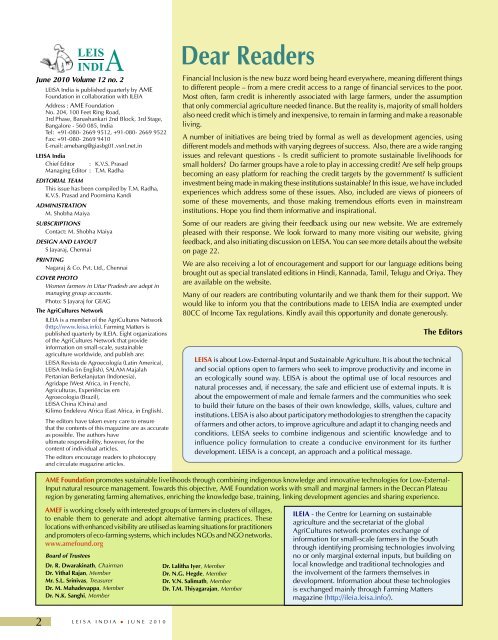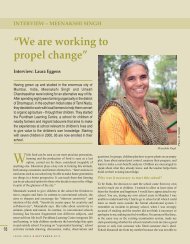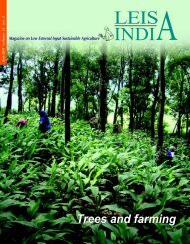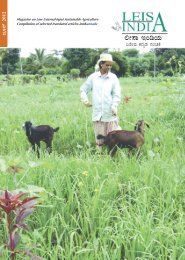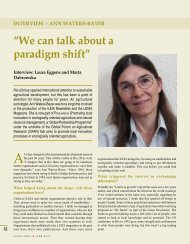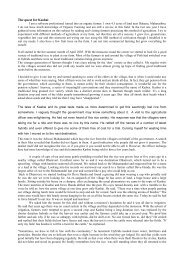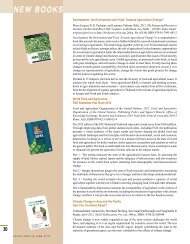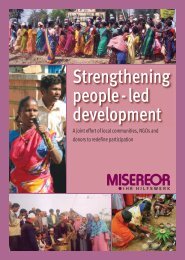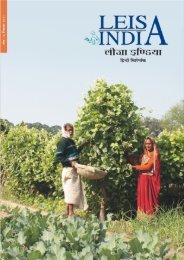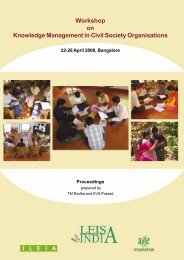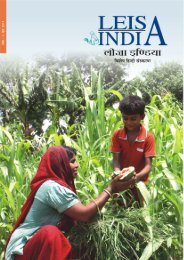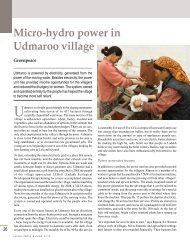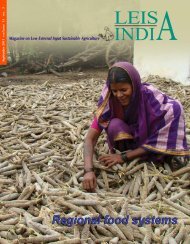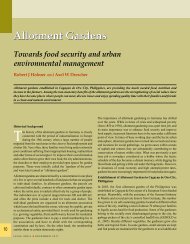INDI LEISA - Leisa India
INDI LEISA - Leisa India
INDI LEISA - Leisa India
You also want an ePaper? Increase the reach of your titles
YUMPU automatically turns print PDFs into web optimized ePapers that Google loves.
ALEIS<strong>INDI</strong>June 2010 Volume 12 no. 2<strong>LEISA</strong> <strong>India</strong> is published quarterly by AMEFoundation in collaboration with ILEIAAddress : AME FoundationNo. 204, 100 Feet Ring Road,3rd Phase, Banashankari 2nd Block, 3rd Stage,Bangalore - 560 085, <strong>India</strong>Tel: +91-080- 2669 9512, +91-080- 2669 9522Fax: +91-080- 2669 9410E-mail: amebang@giasbg01.vsnl.net.in<strong>LEISA</strong> <strong>India</strong>Chief Editor : K.V.S. PrasadManaging Editor : T.M. RadhaEDITORIAL TEAMThis issue has been compiled by T.M. Radha,K.V.S. Prasad and Poornima KandiADMINISTRATIONM. Shobha MaiyaSUBSCRIPTIONSContact: M. Shobha MaiyaDESIGN AND LAYOUTS Jayaraj, ChennaiPRINTINGNagaraj & Co. Pvt. Ltd., ChennaiCOVER PHOTOWomen farmers in Uttar Pradesh are adept inmanaging group accounts.Photo: S Jayaraj for GEAGThe AgriCultures NetworkILEIA is a member of the AgriCultures Network(http://www.leisa.info). Farming Matters ispublished quarterly by ILEIA. Eight organizationsof the AgriCultures Network that provideinformation on small-scale, sustainableagriculture worldwide, and publish are:<strong>LEISA</strong> Revista de Agroecología (Latin America),<strong>LEISA</strong> <strong>India</strong> (in English), SALAM MajalahPertanian Berkelanjutan (Indonesia),Agridape (West Africa, in French),Agriculturas, Experiências emAgroecologia (Brazil),<strong>LEISA</strong> China (China) andKilimo Endelevu Africa (East Africa, in English).The editors have taken every care to ensurethat the contents of this magazine are as accurateas possible. The authors haveultimate responsibility, however, for thecontent of individual articles.The editors encourage readers to photocopyand circulate magazine articles.Dear ReadersFinancial Inclusion is the new buzz word being heard everywhere, meaning different thingsto different people – from a mere credit access to a range of financial services to the poor.Most often, farm credit is inherently associated with large farmers, under the assumptionthat only commercial agriculture needed finance. But the reality is, majority of small holdersalso need credit which is timely and inexpensive, to remain in farming and make a reasonableliving.A number of initiatives are being tried by formal as well as development agencies, usingdifferent models and methods with varying degrees of success. Also, there are a wide rangingissues and relevant questions - Is credit sufficient to promote sustainable livelihoods forsmall holders? Do farmer groups have a role to play in accessing credit? Are self help groupsbecoming an easy platform for reaching the credit targets by the government? Is sufficientinvestment being made in making these institutions sustainable? In this issue, we have includedexperiences which address some of these issues. Also, included are views of pioneers ofsome of these movements, and those making tremendous efforts even in mainstreaminstitutions. Hope you find them informative and inspirational.Some of our readers are giving their feedback using our new website. We are extremelypleased with their response. We look forward to many more visiting our website, givingfeedback, and also initiating discussion on <strong>LEISA</strong>. You can see more details about the websiteon page 22.We are also receiving a lot of encouragement and support for our language editions beingbrought out as special translated editions in Hindi, Kannada, Tamil, Telugu and Oriya. Theyare available on the website.Many of our readers are contributing voluntarily and we thank them for their support. Wewould like to inform you that the contributions made to <strong>LEISA</strong> <strong>India</strong> are exempted under80CC of Income Tax regulations. Kindly avail this opportunity and donate generously.The Editors<strong>LEISA</strong> is about Low-External-Input and Sustainable Agriculture. It is about the technicaland social options open to farmers who seek to improve productivity and income inan ecologically sound way. <strong>LEISA</strong> is about the optimal use of local resources andnatural processes and, if necessary, the safe and efficient use of external inputs. It isabout the empowerment of male and female farmers and the communities who seekto build their future on the bases of their own knowledge, skills, values, culture andinstitutions. <strong>LEISA</strong> is also about participatory methodologies to strengthen the capacityof farmers and other actors, to improve agriculture and adapt it to changing needs andconditions. <strong>LEISA</strong> seeks to combine indigenous and scientific knowledge and toinfluence policy formulation to create a conducive environment for its furtherdevelopment. <strong>LEISA</strong> is a concept, an approach and a political message.AME Foundation promotes sustainable livelihoods through combining indigenous knowledge and innovative technologies for Low-External-Input natural resource management. Towards this objective, AME Foundation works with small and marginal farmers in the Deccan Plateauregion by generating farming alternatives, enriching the knowledge base, training, linking development agencies and sharing experience.AMEF is working closely with interested groups of farmers in clusters of villages,to enable them to generate and adopt alternative farming practices. Theselocations with enhanced visibility are utilised as learning situations for practitionersand promoters of eco-farming systems, which includes NGOs and NGO networks.www.amefound.orgBoard of TrusteesDr. R. Dwarakinath, ChairmanDr. Vithal Rajan, MemberMr. S.L. Srinivas, TreasurerDr. M. Mahadevappa, MemberDr. N.K. Sanghi, MemberDr. Lalitha Iyer, MemberDr. N.G. Hegde, MemberDr. V.N. Salimath, MemberDr. T.M. Thiyagarajan, MemberILEIA - the Centre for Learning on sustainableagriculture and the secretariat of the globalAgriCultures network promotes exchange ofinformation for small-scale farmers in the Souththrough identifying promising technologies involvingno or only marginal external inputs, but building onlocal knowledge and traditional technologies andthe involvement of the farmers themselves indevelopment. Information about these technologiesis exchanged mainly through Farming Mattersmagazine (http://ileia.leisa.info/).2<strong>LEISA</strong> <strong>INDI</strong>A • JUNE 2010


